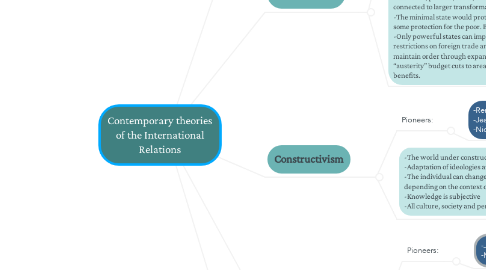Contemporary theories of the International Relations
by Nora Stela


1. Neoliberalism
1.1. Pioneers:
1.1.1. -Ludwig von Mises -Friedrich von Hayek
1.2. -Is grounded in the assumption that governments cannot create economic growth or provide social welfare; rather, governments make the world worse for everyone, including the poor. -Private companies, private individuals, and, most importantly, unhindered markets are best able to generate economic growth and social welfare. -Economic, political, social, and cultural phenomena worldwide might be connected to larger transformations in global capitalism. -The minimal state would protect private property, maintain order, and provide some protection for the poor. But this state needs the help of powerful ones. -Only powerful states can implement policies that deregulate industry, relax restrictions on foreign trade and flows of money, privatize state companies, maintain order through expanding prison and security systems, and make “austerity” budget cuts to areas like social services, education, and welfare benefits.
2. Neorealism
2.1. Pioneer:
2.1.1. Kenneth Waltz
2.2. -Especially by its self-conscious comparisons of great-power politics -Also known as "structural realism" -In international politics, war is a possibility at any time. The international system is "anarchic" -Norms, laws, ideologies and other factors are acknowledged as influencing the behavior of individual governments -Treats weapons technology as another important “systemic” property. -International law and institutions as epiphenomena of the desires of great powers (they affect the behavior of nation-states)
3. Constructivism
3.1. Pioneers:
3.1.1. -Rene Descartes -Jean Piaget -Nicolas Onuf
3.2. -The world under construction -Adaptation of ideologies and interests -The individual can change perspective and act in a selfish or altruistic way, depending on the context or society -Knowledge is subjective -All culture, society and perspectives are equally valid
4. Feminist Theory
4.1. Pioneers:
4.1.1. -J. Ann Tickner -Mary Wollstonecraft
4.2. -Believes that people see masculine (stereotypical) characteristics as coldness and rationality in a positive way, and feminine characteristics as emotions in a negative way. -See the world from a perspective of disadvantage for women and therefore seeks gender equality -Realism and liberalism are products of the male idea -He does not see the international system as a hierarchical system but rather an interrelational system
5. Critical Theory
5.1. Pioneers:
5.1.1. -Herbert Marcuse -Jürgen Habermas
